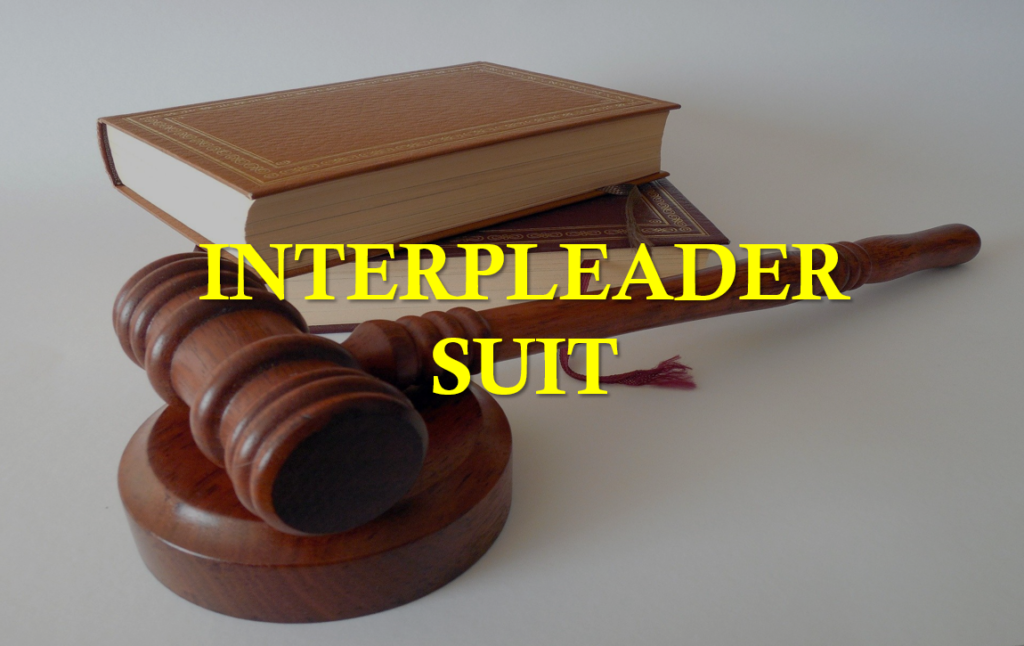
What is Interpleader Suit?
In Halsbury’s Laws of England, it has been staff that:
Where a person is under liability in respect of a debt or in respect of any money, goods or chattels and he is, or expects to be, sued for or in respect of that debt or money, or those goods or chattels, by two or more persons making adverse claims thereto, he may apply to the court for relief by the way of interpleader.
Simply put, to interplead means to litigate with each other to settle a point concerning third-party.
Section 88 and Order 35 gives provisions for interpleader suit.
In an interpleader suit, the real dispute is not between a plaintiff and a defendant but between defendants who interplead against each other, unlike in an ordinary suit. In an interpleader suit, the plaintiff is not really interested in the subject-matter of the suit.
Section 88 of the Code enacts that, two or more persons claiming adversely to one another the same debt, sum of money or other property, movable or immovable, from a person who does not claim any interest therein except the charges and costs incurred by him and is ready to pay or deliver the same to the rightful claimant, may file an interpleader suit.
Illustration-
X is in possession of property claimed by Y and Z adversely. X does not claim any interest in the property and is ready to deliver it to the rightful owner. In this case, X can institute an interpleader suit.
Conditions
As per section 88, before an interpleader suit can be instituted, the following conditions must be satisfied:
- There must be some debt, sum of money or other property, movable or immovable in dispute;
- Two or more persons must be claiming it adversely to one another;
- The person from whom such debt, money or property is claimed must not be claiming interest therein, other than the charges and costs and he must be ready anf willing to pay or deliver it to the rightful claimant; and
- There must be no suit pending wherein the rights of rival claimants can be properly adjudicated.
Who may file an interpleader suit?
In Robinson v. Jenkins (1890) it was held that a person who has no interest in any debt, sum of money or other property, movable or immovable except the charges and costs incurred by him and is ready to pay or deliver the same to the rightful claimant may file an interpleader suit.
Who cannot file an interpleader suit?
As per Order 35 Rule 5, an agent cannot sue his principal, or a tenant or his landlord, for the purpose of compelling them to interplead with persons other than persons claiming through such principals and landlords.
Procedure
Order 35 Rule 1 to 4 lays down the procedure for interpleader suit.
Rule 1 states that in every interpleader suit, in addition to other statements, the plaint must also state the following:
- That the plaintiff claims no interest in subject-matter in dispute other than the charges and costs;
- The claims have been made by the defendants severally; and
- There is no collusion between the plaintiff and any of the defendants.
The court may order the plaintiff to deposit the amount or place the property in custody of the Court and provide costs incurred by him by giving him a charge on the thing claimed.
Rule 4 states that the court may declare that the plaintiff is discharged from all liability, award him costs and dismiss him from the suit at first hearing.
On basis of evidence available, the Court may also adjudicate the title to the things claimed. Where it is not possible, the Court may direct that an issue or issues between the parties be framed and tired, one of the claimants be made a plaintiff in lieu of or in addition to the original plaintiff and the suit shall proceed in an ordinary manner.




0 Comments